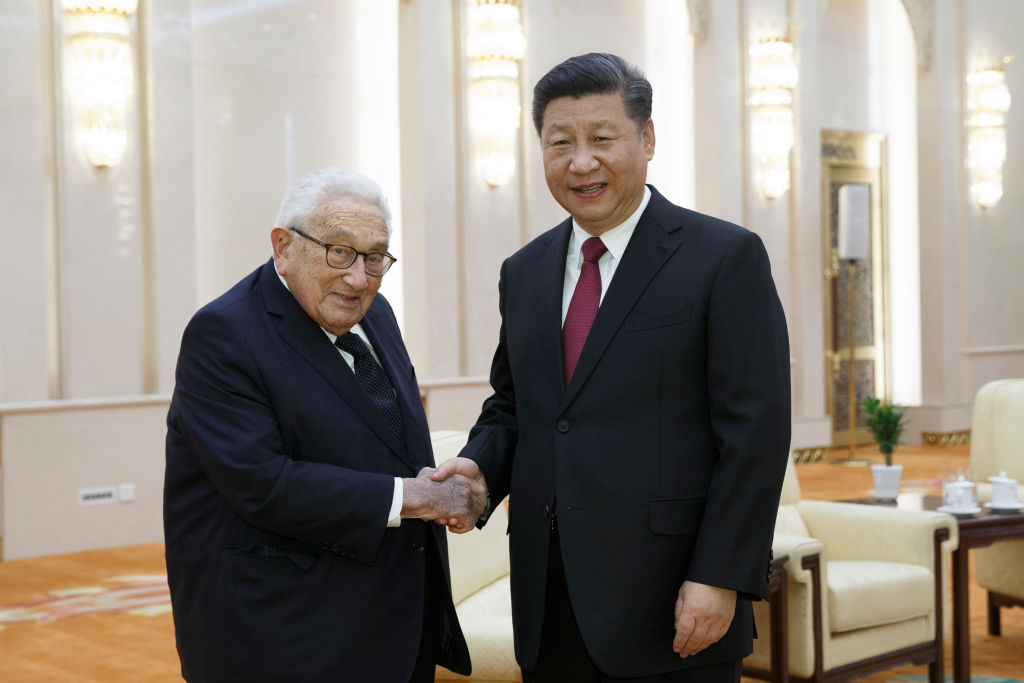On Henry Kissinger’s passing, Xi Jinping published a letter, extolling this ‘old friend of China’ as a man of ‘outstanding strategic vision’, whose exploits not just benefited the relationship between China and the United States, but also ‘changed the world’. Xi’s tribute reads like an indictment of the current lamentable state of Sino-American relations (clearly by design). Xi presents Kissinger as a model statesman that China would like to have in place of the current US foreign policy elite.
Russia’s Vladimir Putin, too, sent a rare letter of condolences, praising Kissinger as an ‘outstanding diplomat, wise and farsighted statesman’, who pursued ‘a pragmatic foreign policy’ and helped broker détente. Andrei Kortunov, a foreign policy hand with the Russian International Affairs Council, contrasted Kissinger’s many talents with their ‘critical shortage’ among current US leaders.
Such commentary mythologises and simplifies Kissinger as an ideal interlocutor who Beijing and Moscow could deal with. If only such statesmen were still around! The reality was much more complicated. Henry Kissinger’s exploits in 1969-76, when he served as Richard Nixon’s national security adviser and (later) Nixon’s and Gerald Ford’s secretary of state, were notable for leaving his interlocutors – the Chinese and the Soviets – angry and resentful.
It could not have been otherwise. Kissinger crafted and pursued a policy that served American national interests, and that meant undermining America’s adversaries, and playing them one against the other.
Among those who felt most resentful about Kissinger was, ironically, Mao Zedong. Mao’s turn towards the United States was born of a necessity. He feared a Soviet invasion, and thought that by realigning with the United States, he might address China’s strategic vulnerabilities.
Mao felt that he could play Kissinger, whom he derisively described as ‘a stinking scholar… a university professor who does not know anything about diplomacy’. But in the end, he felt cheated by what he saw as American card-playing in order to build up leverage with Moscow.
‘We see that what you are doing is leaping to Moscow by way of our shoulders’, Mao lamented ruefully in a conversation with Kissinger in October 1975. Kissinger, he claimed, failed to commit the United States to a deeper, more strategic relationship with China, and was merely manoeuvring for advantage. A ‘very bad man’ was how Mao summed up Kissinger in 1975 in a conversation with North Korea’s Kim Il-Sung. Kim agreed that Kissinger was ‘wily’.
In Xi’s and Putin’s brutal world, it is power that commands respects
The Soviet leaders, too, had their difficulties with Kissinger. General secretary Leonid Brezhnev was convinced that the national security adviser had a bad influence on Richard Nixon, on whom Brezhnev pinned his hopes for détente. Brezhnev was worried, rightly, that Kissinger would sabotage Soviet efforts to rope Nixon into endorsing Soviet objectives vis-à-vis China and in the Middle East.
In fact, Brezhnev was so worried about Kissinger’s influence that he deliberately tried to exclude him from private conversations with Nixon, in particular those relating to the Arab-Israeli conflict (the General secretary, knowing of Kissinger’s Jewish background, wrongly suspected him of harboring pro-Israeli sentiments).
And yet the Soviet leader also courted Kissinger. On one occasion in spring 1973 he took Kissinger hunting boars. In the seclusion of the hunting tower, Brezhnev tried a heart-to-heart approach, pleading with Kissinger to respect Moscow’s global interests and to let it run the world in partnership with the United States.
The idea was a non-starter. During the Yom Kippur War in October 1973, Kissinger responded to Soviet threats by raising the American nuclear alert level to Defcon 3 – the highest since the Cuban Missile Crisis. Technically, the decision was the president’s. But Nixon, battered by Watergate, had by then effectively ceded control of foreign policy making to his secretary of state.
Brezhnev was horrified – but quickly backed down. The Yom Kippur War dealt a major blow to the Soviet strategy in the Middle East. Egypt’s Anwar Sadat soon switched sides, ditching his Soviet sponsors for a more rewarding relationship with the United States. Kissinger played a key role in this game for political influence, outplaying the Soviets at every turn. ‘A smart, cunning guy’, Brezhnev said of Kissinger in 1974, in a serious understatement.
Kissinger won grudging admiration of America’s adversaries, an admiration that we can still read today in the words of praise offered by Xi Jinping and Putin. There is something remarkable in the way that Kissinger – whose major diplomatic achievement was to successfully play Beijing and Moscow against one another by exploiting their insecurities and delusions – is now held up by both as a model statesman.
In Xi’s and Putin’s brutal world, it is power that commands respects. They respect Kissinger not because he offered, but because he demanded; not because he deferred, but because he asked for deference; and not because he conceded, but because he stood firm – all in pursuit of American interest.
Kissinger’s deft diplomacy steered the United States from its Vietnam-era self-doubt, helping it win in the cold war. This is the part of Kissinger’s ‘outstanding strategic vision’ that Xi and Putin are unlikely to ever acknowledge but that represents a towering achievement of this old friend of China and Russia, and his most enduring legacy.







Comments